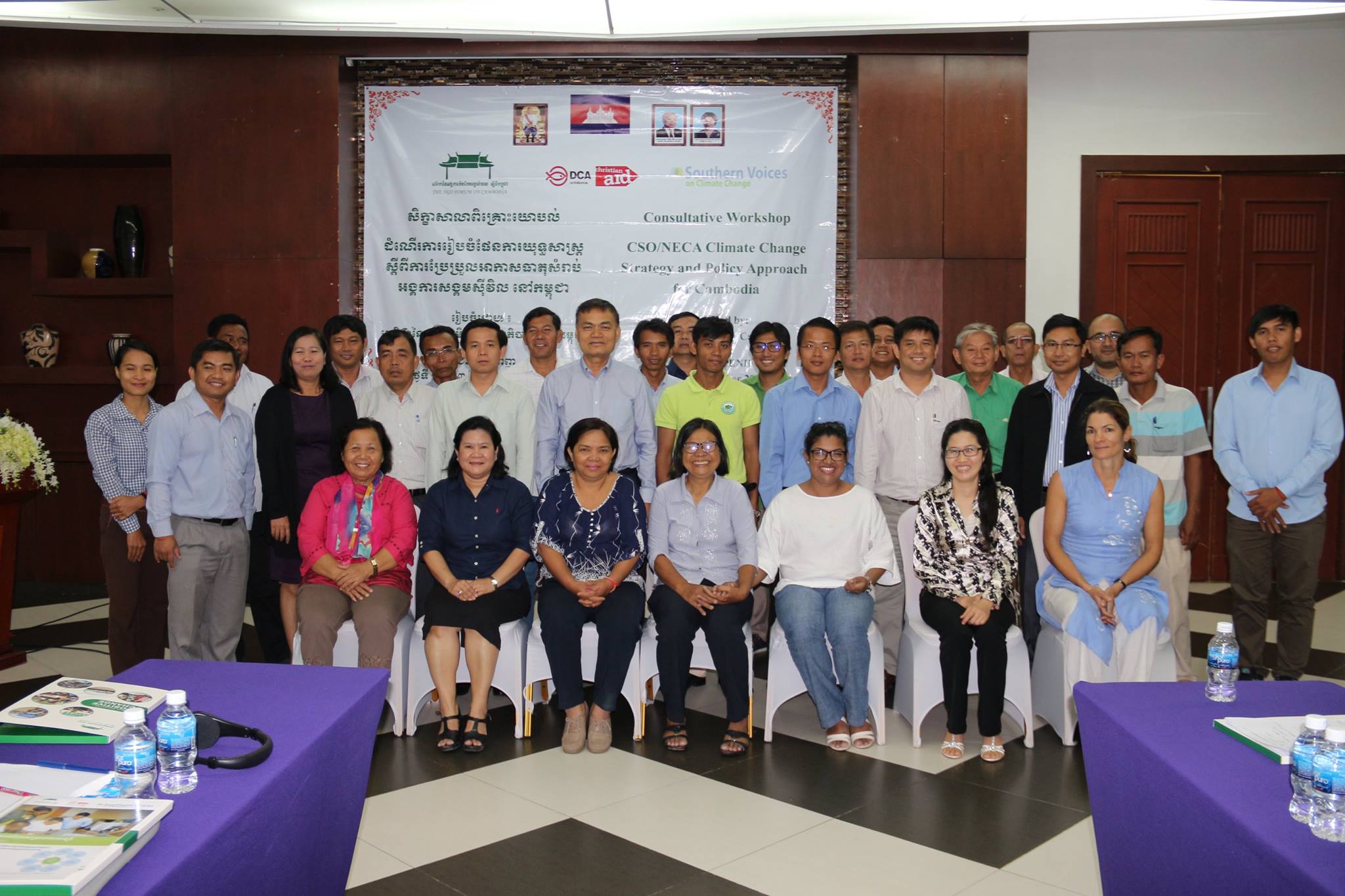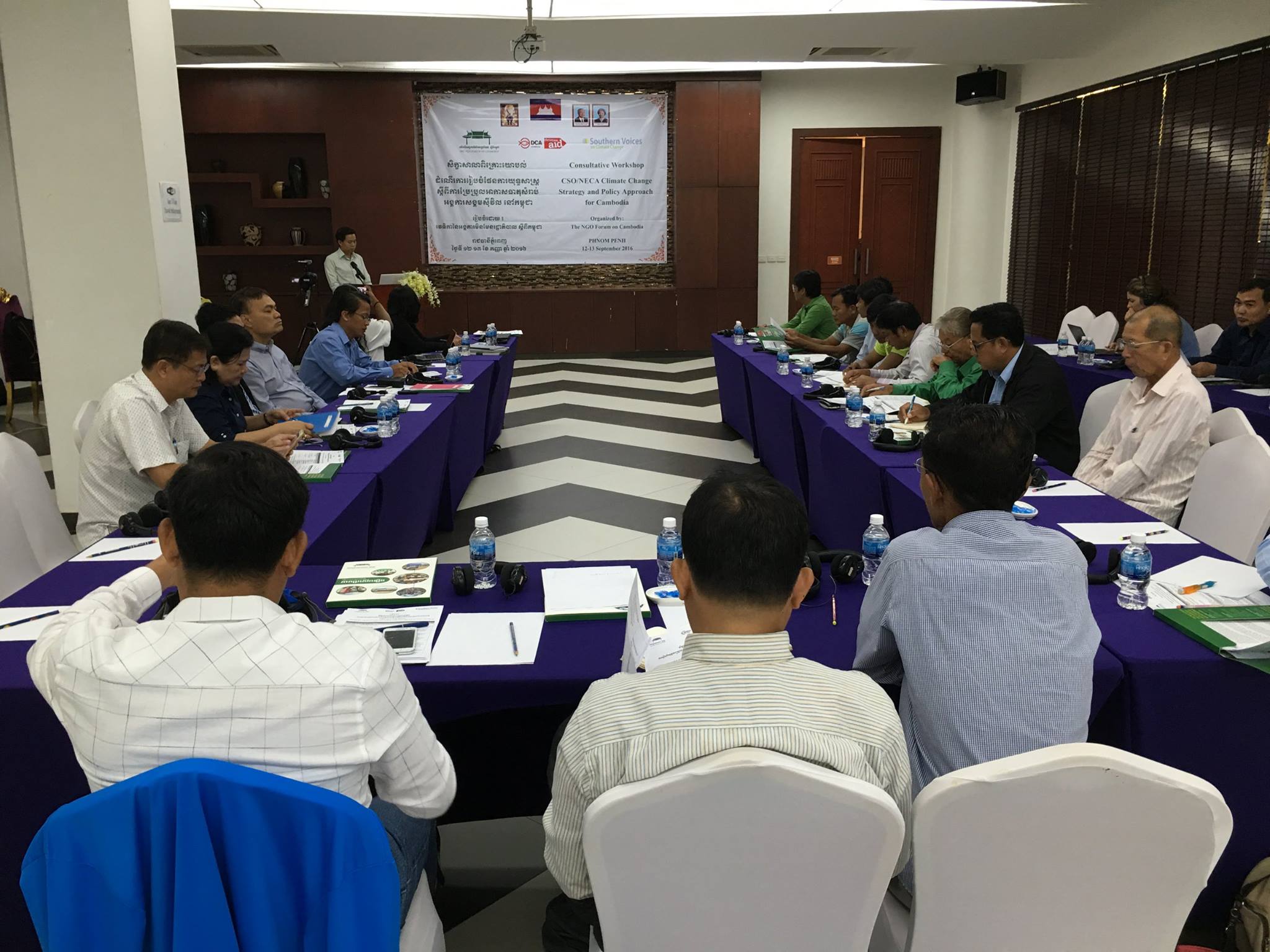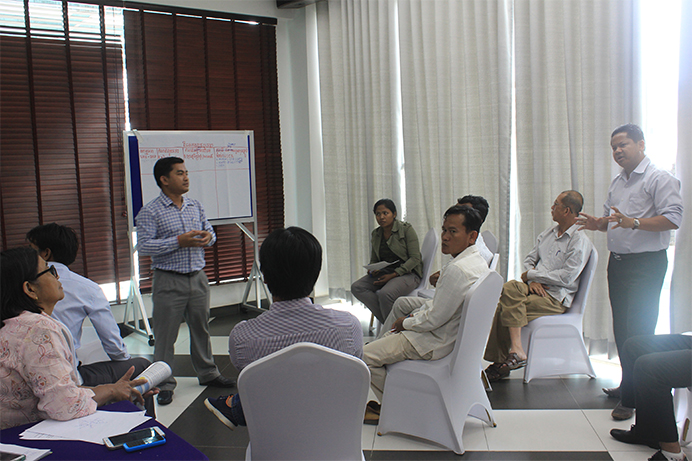
Consultative Workshop on Climate Change Strategy and Policy Approach for Cambodia
Phnom Penh, Cambodia 12-13 September 2016: There are forty five from NECA members, Local Authorities, related Government officers, Development Partners together join in consultative workshop facilitating by climate change policy monitoring project of the NGO Forum on Cambodia with aiming 1) refreshing the Southern Voice Program as well as JPA principles to stakeholders 2) learn last update from relevant stakeholder on Cambodia climate change policies and strategies and relevant partners 3) validate the results of the survey among relevant stakeholders and 4) seek for agreement on the advocacy strategy for climate change policy influence in both national and sub-national level particularly in the Commune Development Plan/Commune Investment Plan (CDP/CIP). The NGO Forum on Cambodia (NGOF), DanChurchAid/ChristianAid (DCA/CA) and Southern Voice on Climate Change – CARE Denmark have initiated and provided financial support to conduct the research on “Advocacy Strategy Analysis on Climate Change Policy Influence into Commune Development Plan” from early July 2016. The preliminary result of the research has been completed at the end of July 2016 by the independent consultant team. To ensure the quality of the research results, validation workshop under the coordination and financial support of the NGOF will be conducted with relevant stakeholders particularly NECA members, relevant stakeholder affected communities, government officers including national and sub-national level, and partners of southern voice on adaptation in Cambodia and in the regional level.
Tek Vannara, PhD, Executive Director of NGOF and NECA Steering Committee member had addressed that Cambodia is highly vulnerable to climate change, due to both high levels of poverty and frequency of disasters of climate change hazard. In 2014, it is commonly named as one of the most at-risk countries in the world. 80% of the population living in rural, and about 70% engaging in agriculture – primarily rain-fed agriculture. In 2011, there were 431,000 hectares of transplanted rice fields were affected and 267,000 hectares of rice fields were damaged by flood while 3,804 hectares of rice fields were affected by drought. Nearly 50% of the total communes in Cambodia are categorised between vulnerable to extremely vulnerable to climate viability, according to the Second National Communication to the United Nations Framework Convention on Climate Change (UNFCCC). A public perception survey on climate change conducted in 2010 found that more than 50% of respondents indicated the lack of accessing to information related to climate change and 60% of the respondents do not know how to respond to climate change. The need for Climate Change Adaptation (CCA) and Disaster Risk Management (DRM) mainstreaming has become recognized as increasingly important in building the country’s absorptive capacity and enhancing community resilience. However, CCA and DRR intervention in community level is still have long destination to get rid of.
The need for climate change adaptation and disaster risk management mainstreaming has become recognized as increasingly important in building the country’s absorptive capacity and enhancing community resilience. Climate change mainstreaming interventions have been implemented to pilot the process of mainstreaming climate change into national, sectoral and sub-national levels under different initiatives.

Ms. Vositha Wijenayake a regional facilitator of Southern Voice on Climate Change (SVA) said that the Joint Principle for Adaptation (JPA) is a benchmark for good adaptation planning and implementation both in the national and local level to meet the needs and fulfill the rights of the most vulnerable people to adapt to climate change. It was developed over 2014 and 2015 by civil society networks working on climate change from Africa, Asia and Latin America, under a project known as Southern Voices on Adaptation (SVA). In the first phase of Southern Voice for Adaptation (SV-Adapt), it was revealed the successfulness in developing the JPA, and in engaging with governments and other actors to promote the pro-poor adaptation in national policy frameworks. But only a few successful cases were addressing on the changing of the adaptation policy frameworks and its implementations.
One of the key lessons we have learned is that even if it may sometime be easy to engage with government counterparts, it often takes longer time than expected to achieve significant policy change. Policy advocacy is a long term process, and often the road is bumpy.
As we receive more results in terms of influencing adaptation policies based on recommendations from the JPA – we are in a better basis for achieving more recognition for the JPA in international fora. This in turn will provide a better impetus for results at national level, as illustrated in the diagram below.
In order to stand a serious chance of influencing policies, it is crucial to have a strategy and action plan with capacity need assessment.
According to the case study in 2011 on “Building Support for advocacy in Cambodia” of Southern Voices on Climate Change, integrating Climate Change into the government policies is still weak due to the limit capacity of mainstreaming this concept into the implementation of both government agencies and Non-Government Organizations/Civil Society Organizations (NGOs/CSOs)’ programmes or projects . This has led to the difficulty of government and donors to meet the need of the vulnerable people who directly been affected by the climate change disasters. Some challenges were identified as the barriers of effective climate change management in Cambodia from the national to local level including:
• Limited coordination among the government’s ministries, among donors, between the government and donor, and between government and implementing NGOs.
• Limited knowledge and engagement of community and civil society organization on climate change policy/strategy at sub-national and national level.
• Limited national budget allocation especially to sub-national and grass root level for addressing climate change issues.
To deal such this problem, advocacy strategy of the NGO Forum on Cambodia (NGOF) and NGOs Environment and Climate change Alliance (NECA) on climate change policy influencing and the implementation of CCA at both national and sub-national level are crucial. The best practice of CCA with the application of JPA in the local affected areas, challenges/lesson learnt that CSOs and communities have encountered/learned from the CC projects, and opportunities for CCA actions in the commune level are the main pictures to find out the future advocacy for the effective climate change policy influencing and practicing.
